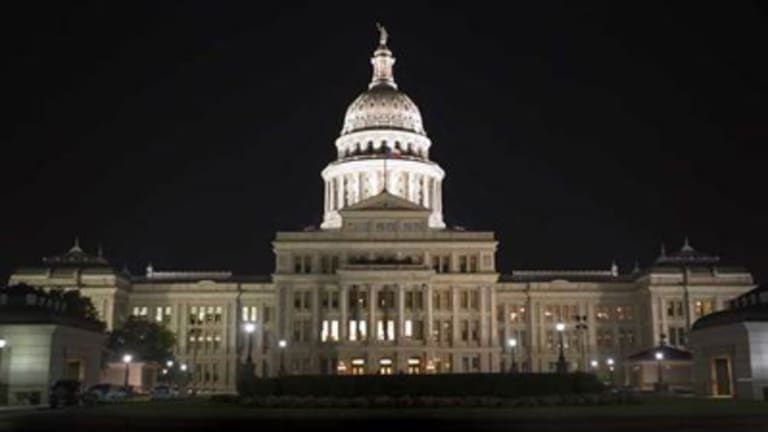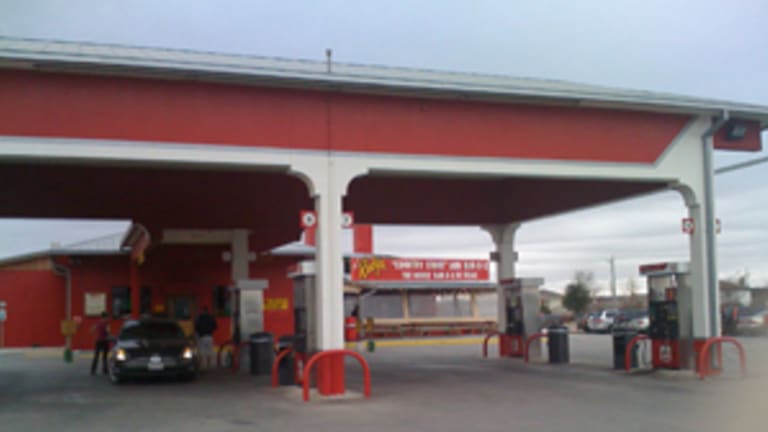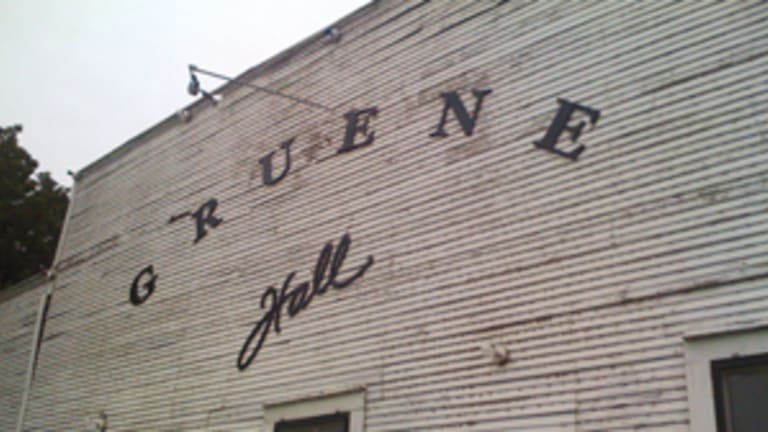I've been wanting to write a travel post about my recent New Year's trip to Texas. This is my last chance, really, with the Aussie Open looming. So here's one last pre-tournament respite from tennis, for anyone interested. My men's preview is on the home page; feel free to comment on it on the previous CE post (not on this one). I'll be back with a look at the women's draw tomorrow.
For years, I’d had two very different impressions of Austin, Texas. The earliest came from the long-running live music show Austin City Limits, which I can first remember seeing in the early 1980s. Along with the cheesy video program Night Flight on USA, it was an early televised window into music for me. The only evidence of Austin itself was an image of the colossal Texas state capital, which periodically floated behind the set like a bombastic but oddly beautiful cloud of authority. My second and much weirder impression of the city came from the movie Slacker, director Richard Linklater’s small classic from the early 90s, where a semi-deranged group of 20-somethings make aimlessness into an art form in Austin. They’re happy, though a little defensive, to eat, sleep, watch live music, wander the streets, and discuss Kennedy-assassination theories.
I finally made the trip to the well-loved scruffy city myself over the New Year’s break, with my girlfriend Julie. We started in Austin, then drove to San Antonio—five days total in the famous and dusty Hill Country of Texas. The weather was cooperative: It was sunny and in the 70s, a nice but not-too-shocking change from the 30-degree rain pelting the streets of New York. More than that, the warm air in Austin felt gentle, a feeling I’d only associated with the best days in Northern California. It didn’t seem fair: How can a Northeasterner keep a bad mood going in that kind of weather?
Still, I began this trip with a semi-infuriating mistake. On our second day there, I scrolled through some online music listings for Austin and discovered that folk-country-leftwing-redneck singer Todd Snider had played the night before at the legendary little dance joint Gruene Hall, south of the city. Never mind that as a resident of New York City I probably could have seen Snider a hundred times and had never taken the opportunity, even though I own half a dozen of his records and occasionally recite his day-seizing anthem “Enjoy Yourself” (“Enjoy yourself/It’s later than you think”). The point was to hear Snider in Texas. By now, virtually any show that I go to in my hometown seems like it’s part of the daily routine—fun, but normal rather than thought-provoking. To see that show in a new place, that’s cool, that’s romantic, that’s daring, whatever you want to call it—it’s exciting.
There’s comfort in routine. Why else, despite being surrounded by hundreds of world-class restaurants in New York, would I regularly skip them all in favor of the just-slightly-above-average Tex Mex place down the street, where I can talk to one bartender about college football and another about rock and roll (as you may be able to tell, I’m not a foodie)? There’s comfort in routine, but nothing to make you sit up a little straighter and open your eyes a little wider, the way you do when you’re someplace new. It’s a chore breaking out of habits—is there a more powerful force in the universe?—but it must be done if you don’t want your brain to atrophy. As Snider puts it in “Enjoy Yourself,”
*You’re gonna take that ocean trip
No matter come what may.
You got your reservations
But you just can't get away.
Next year, for sure, you’ll see the world,
You’ll really get around;
But how far can you travel
When you’re six feet underground?*
Of course, there’s a downside to breaking your routine. When I take a day off from work, my mind is vulnerable to all the shameful demons from my past and all the fears of the future. Normally, these are kept at bay by the daily goals and obligations of work. A full week day without a definite purpose? That can be a scary thought, and there have been many afternoons when I’ve contemplated giving up and just going into the office, even though I’ve taken it as a vacation day.
A full-fledged vacation should take care of that; in theory, you have things to do. But no, even in Texas, with the gentle air and clear skies, I could find myself in the middle of the afternoon wondering what my purpose on this planet was: Why had I chosen to come to a place that housed a bar called the Chuggin’ Monkey? What was San Antonio’s Riverwalk but a theme park with margaritas and souvenir T-shirts instead of rollercoasters? Why, when I visited the Texas State House and the Alamo, did I feel like a school kid on a field trip?
Actually, I’ve come to like the field trip stuff as an adult. The State House is as grand as advertised. It’s larger than the Capitol in D.C.—this is Texas, not just the piddly United States of America, after all—and you can see its pink walls floating in the distance from pretty much anywhere in the city, just as it did on Austin City Limits. From that description, you might think it’s an oppressive symbol of a government that can find you wherever you are (it was once the house of Dubya), but I thought of it more as a quaint and kind of funny monument to Texas bravado. Except, perhaps, for the prominent statue on its front lawn commemorating the state’s participation in the Confederacy.
It doesn’t take long for a city to widen in my mind during a trip—you begin in one place and think that’s the whole town, until you drive a few blocks away and experience a completely different vibe. In Austin we started in the old downtown section, at the Driskill, a grande dame hotel where the bathroom towels feature a giant monogrammed D at their center. It’s founder was a man named Jesse Driskill, which has to be one of the great names I’ve ever heard. Driving there from the airport, we saw a bumper sticker that read, “I’d rather be drunk,” and another that read, "This ain't my first rodeo." Julie spotted a guy in a cowboy hat.
“He’s wearing one of the hats!” We stared.
We quickly found that the soul of Austin is on the other side of the river, in the thrift shops, hipster hotels, and former-car-shops-turned-outdoor-bars on South Congress St.—the Slacker side of town, where cowboy hats are rare. The same was true in San Antonio. Once we escaped the River Walk, there was a suitably grungy arts district, a fabulous and streamer-filled all-night Mexican diner, an even more fabulous pancake house in a godforsaken strip mall, and some of the best barbeque we’d ever had in a restaurant that doubled as a gas station.
Here’s some more of the Hill Country highlight reel:
—Waterloo Records seems to be music central in Austin. I walked in and immediately recognized a favorite scent from my youth—the musty mix of long-resting cardboard and vinyl that fills record stores from Burlington to Berkeley. I began the familiar motion of flipping records back with my index finger, something I don’t get to do to often anymore in NYC. But I didn’t see much of interest, and I briefly thought I had lost the old passion for these relics. Then I passed the New Arrivals section and thought, Of course, that’s the only section that will ever have anything decent in it. I figured Austin for a town full of record-collector scum (it’s no insult; that’s what we call ourselves). I was right, in those racks were tossed-away gems like Hüsker Dü’s Flip Your Wig; Bud Powell’s Bouncing with Bud; Duke Ellington’s Far East Suite; even the soundtrack to the 1964 Olympics in Tokyo. I needed to hear the “music to swim laps to.” I had the old collector’s urge back, so much so that I found myself hoping that the clerk at the cash register would give me a sign that he approved of my purchases, the way the clerks always did back in State College, Pa. No such luck this time. I got over it.
—Across the street from Waterloo is Book People, a two-story establishment that functions not just as a store, but as a locus and neighborhood for anyone interested in books in the area, like Elliott Bay in Seattle, Powell’s in Portland, and the Tattered Cover in Denver—some of my favorite places anywhere. I loved Book People as well and felt like I could happily spend a day there. Which was odd, when I thought about it longer. I live across the street in Brooklyn from a small independent bookstore that everyone who visits inevitably calls “cute.” It is cute, and quaint, and clean, and friendly, and I buy books there all the time. But it also strikes me as one of the dreariest places on earth; the thought of spending an entire day in there is enough to make me want to cry. Now I realize why: I pass it every day on my way to and from work. If I passed Book People going to work, I would probably find it just as horrible after about three weeks.
—Austin is all about barbeque, we were told. We tried to go to a couple of the better-known joints downtown, only to find them closed by 10:30—this was when we knew we weren’t in New York City anymore. So we tried the south side of town, stopping at the Green Mesquite, which looked like any other diner, with five or six glass-topped tables and beat-up booths. But this is a diner that just happened to have ridiculous smoked chicken (“ridiculous” is the extent of my abilities as a food critic). The waiter sported a long scraggly beard and wore sneakers and a trucker’s hat. When we asked which was better, the brisket or the pork ribs, he nodded and immediately said in a no-nonsense voice, “Oh, the brisket.”
—The Hill Country between Austin and San Antonio is full of beautifully dusty brown vistas and live oaks. It also seems to be a hotbed of roadside gentleman’s clubs. Best name: “The Wild Boar: A Gentleman’s Paradise.”
—San Antonio looked, to these untrained eyes, to be a uniquely smooth mix of American and Mexican culture. We were there for 48 hours, but the fusion seemed as complete as any place I’ve been in the States. There was celebration of the Alamo, just down the street from a brightly decorated Mexican diner that served superb enchiladas anytime day or night.


